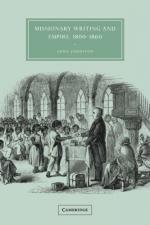|
This section contains 19,823 words (approx. 67 pages at 300 words per page) |

|
SOURCE: Hall, Catherine. “Missionary Stories: Gender and Ethnicity in England in the 1830s and 1840s.” In Cultural Studies, edited by Lawrence Grossberg, Cary Nelson, and Paula A. Treichler, pp. 240-70. New York: Routledge, 1992.
In the following essay, Hall describes the manner in which British missionary rhetoric, sympathetic to black converts, revealed anxiety about English national identity.
In the 1990s nationalisms and national identities have become key political issues.1 The collapse of the Cold War, the reunification of Germany, the re-mapping of Europe, and the planned increased economic and political integration of EEC member countries in 1992 all raise critical questions about the nation-state, national sovereignty, national “belonging,” and forms of citizenship. In this context national identity has emerged as a crucial issue in British politics.
But what does it mean to be British? National communities are, as Benedict Anderson (1983) has argued, “imagined communities.” Whilst sometimes appearing natural they have...
|
This section contains 19,823 words (approx. 67 pages at 300 words per page) |

|


